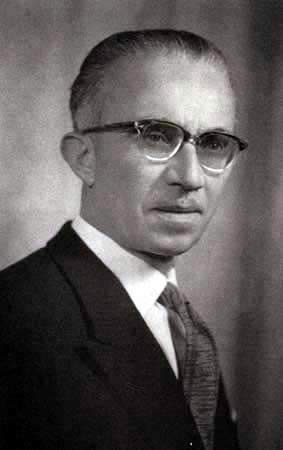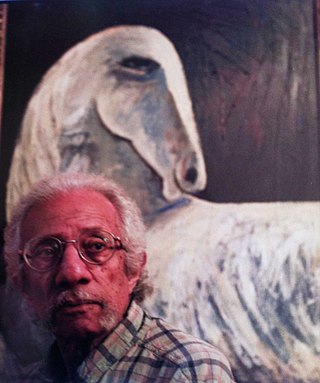Related Research Articles

Abdul-Karim Qasim Muhammad Bakr al-Fadhli al-Zubaidi was an Iraqi military officer and nationalist leader who came to power in 1958 when the Iraqi monarchy was overthrown during the 14 July Revolution. He ruled the country as the prime minister until his downfall and execution during the 1963 Ramadan Revolution.

Abdul Salam Mohammed ʿArif al-Jumayli was the second president of Iraq from 1963 until his death in a plane crash in 1966. He played a leading role in the 14 July Revolution, in which the Hashemite monarchy was overthrown on 14 July 1958.

Abd al-Rahman al-Bazzaz was an Iraqi politician, reformist and writer. He was a pan-Arab nationalist and served as the Dean of Baghdad Law College and later as Prime Minister of Iraq. Al-Bazzaz's main political project was the professionalization of the government through increasing access to civilian expertise. That civic agenda came at the expense of the military. Al-Bazzaz was charged by the Ba'athist-dominated government of participation in activities against the government and he was tortured and imprisoned for fifteen months. Al-Bazzaz was released because of illness in 1970 and moved to London for treatment. He died in Baghdad on 28 June 1973.
Denys Johnson-Davies was an eminent Arabic-to-English literary translator who translated, inter alia, several works by Nobel Prize-winning Egyptian author Naguib Mahfouz, Sudanese author Tayeb Salih, Palestinian poet Mahmud Darwish and Syrian author Zakaria Tamer.
Ra’ouf Mus'ad is a playwright, journalist and novelist who was born in Sudan to Coptic parents from Egypt. He moved to Egypt as a teenager and lived in various countries, both in the Middle East and in Europe, during the past 30 years. He has now settled in Amsterdam with his Dutch wife and their children and has taken Dutch nationality.

Nazim al-Qudsi, was a Syrian politician who served as President of Syria from 14 December 1961 to 8 March 1963.

Mohamed Abdel Hakim Amer, better known as Abdel Hakim Amer, was an Egyptian military officer and politician. Amer served in the 1948 Arab–Israeli War, and played a leading role in the military coup that overthrew King Farouk in 1952. After leading Egyptian forces in the 1956 Suez war, he was appointed Minister for Defense by President Gamal Abdel Nasser and was Egyptian Vice President between 1958 and 1965.

The Hashemite Arab Federation was a short-lived confederation that lasted from 14 February to 2 August 1958, between the Hashemite kingdoms of Iraq and Jordan. Although the name implies a federal structure, it was de facto a confederation.

Amin al-Hafiz, also known as Amin Hafez, was a Syrian general, politician, and member of the Ba'ath Party who served as the President of Syria from 27 July 1963 to 23 February 1966.
Adel Alexander Darwish is a Westminster-based British political journalist, a veteran Fleet Street reporter, author, historian, broadcaster, and political commentator. Darwish is currently a parliament lobby correspondent based at the Press Gallery of the House of Commons, the Palace of Westminster, specialising in foreign affairs, especially Middle Eastern politics; London University Graduate/Post Graduate 1965/1966–1967.

The 14 July Revolution, also known as the 1958 Iraqi military coup, was a coup d'état that took place on 14 July 1958 in Iraq which resulted in the toppling of King Faisal II and the overthrow of the Hashemite-led Kingdom of Iraq. The Iraqi Republic established in its wake ended the Hashemite Arab Federation between Iraq and Jordan that had been established just six months earlier.

Suleiman al-Halabi was a Syrian theology student best known for assassinating Jean-Baptiste Kléber, then serving as the commander of the French campaign in Egypt and Syria, in 1800. Born in the village of Kukan, Ottoman Syria into a family of Kurdish descent, he was sent by his father to study Islamic theology at the Al-Azhar University in Cairo in 1797 when the French launched a concurrent invasion of Egypt. Completing his studies three years later, he returned home before travelling back to Egypt
Youssef Darwish was an Egyptian labour lawyer, communist and activist. During his years of political activism, he was frequently accused of communist subversion and imprisoned, spending around 10 years of his life in jail. Of Jewish background, he converted to Islam in 1947. He was one of the few from the Karaite Jewish community to remain in Egypt after the establishment of Israel in 1948.

The Iraqi Republic, colloquially known as the First Iraqi Republic, as well as Qasimist Iraq (1958–1963) and Nasserist Iraq (1963–1968), was a state forged in 1958 under the rule of President Muhammad Najib ar-Ruba'i and Prime Minister Abdul-Karim Qasim. ar-Ruba'i and Qasim first came to power through the 14 July Revolution in which the Kingdom of Iraq's Hashemite dynasty was overthrown. As a result, the Kingdom and the Arab Federation were dissolved and the Iraqi republic established. Arab nationalists later took power and overthrew Qasim in the Ramadan Revolution in February 1963, and then Nasserists consolidated their power after another coup in November 1963. The era ended with the Ba'athist rise to power in a coup in July 1968.
The history of Egypt under Gamal Abdel Nasser covers the period of Egyptian history from the Egyptian Revolution of 1952, of which Gamal Abdel Nasser was one of the two principal leaders, spanning Nasser's presidency of Egypt from 1956 to his death in 1970. Nasser's tenure as Egypt's leader heralded a new period of modernisation and socialist reform in Egypt, along with a staunch advocacy of pan-Arab nationalism, and developing world solidarity. His prestige in Egypt and throughout the Arab World soared in the wake of his nationalisation of the Suez Canal Company in 1956, and Egypt's political victory in the subsequent Suez Crisis, but was damaged badly by Israel's victory in the Six-Day War.

Munif al-Razzaz was a Jordanian-Syrian physician and politician who was the second, and last, Secretary General of the National Command of the Arab Socialist Ba'ath Party, having been elected to the post at the 8th National Congress held in April 1965.
Jawad al-Assadi is an Iraqi theater director, playwright, theater researcher and poet.

Ahmed Morsi is an Egyptian artist, art critic and poet.
The Buffet is a 1968 one-act play by Ali Salem which is widely regarded as a classic of modern Egyptian theatre. The Buffet was written in 1967, first performed at the Hakim Theatre in Cairo in March 1968, published in Arabic in 1969, and in English translation in 1973 by John Waterbury. The term al-Būfīh in Arabic refers to an office canteen or snack bar, although the play is set not down in the canteen, but upstairs in the office of the theatre manager. The cast requires only three actors: a theatre manager in an unnamed Kafkaesque authoritarian state, a playwright trying to get his play produced, and the waiter who brings food up from the buffet below. These characters symbolise the human contract between the powerful and the powerless and the waiter.
References
- ↑ "Alfred Farag". Oxford Reference. Retrieved 2018-10-30.
- ↑ "Alfred Farag and Egyptian Theater". Syracuse University Press. Retrieved 2018-10-30.
- ↑ "Memorial for Egyptian playwright Alfred Farag (1929-2005)". thesegalcenter.org. Retrieved 2018-10-30.